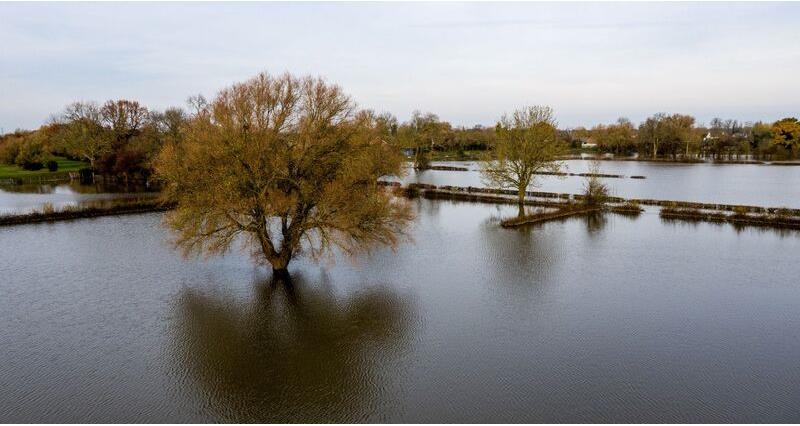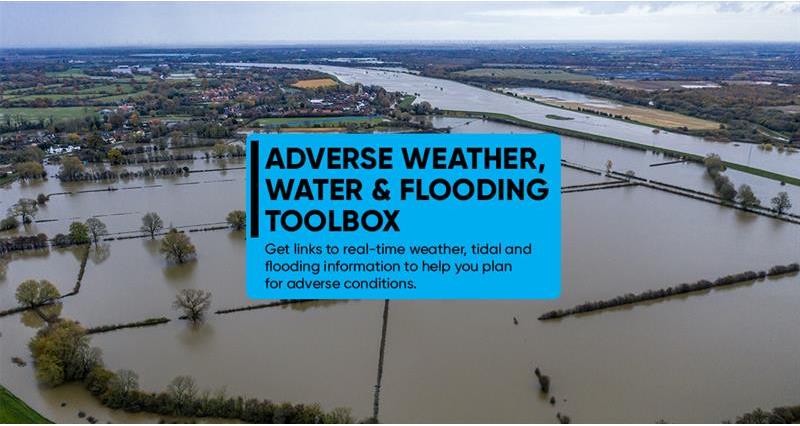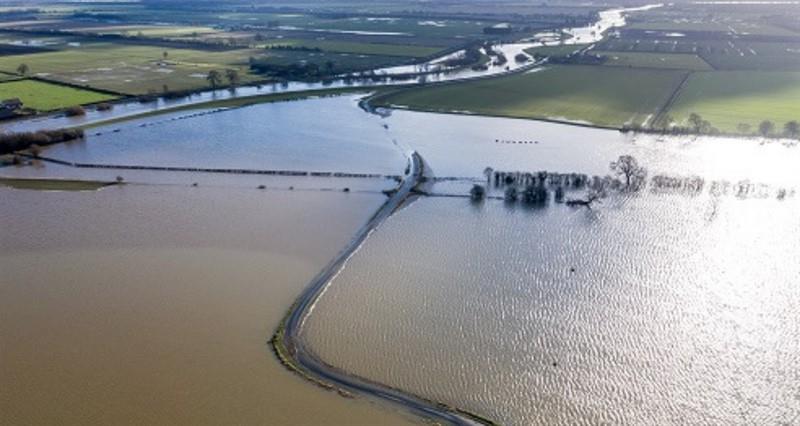With the change in seasons upon us, there’s no better time to start planning for adverse weather. The best way to protect your farm against flooding this winter is to take the following steps:
Prepare
In your flood plan you should:
- Consider how you will communicate flood risk to staff and their role in helping you to prepare, such as . The EA’s (Environment Agency) free flood warning service sends an automatic voice message, text or email when a flood warning is issued. When you register, you should ‘opt in’ to receive flood alerts as well as flood warnings.
- Identify fields at higher levels where livestock can be moved to safety.
- Identify machinery, livestock, tools or chemicals that can be moved to prevent damage.
- Have a contingency plan in place with suppliers to ensure business continuity to help reduce loss of earnings.
- Have a list of procedures that can be quickly accessed by staff during a flood to move livestock, stock and equipment and ensure the safe storage of chemicals and fuel.
- List important contacts, including the EA’s Floodline on 0345 988 1188, building services, suppliers, evacuation contacts for staff, vets and insurance details.
- Have a map showing pathways for water so you can identify opportunities to slow, store and filter runoff and floodwater on your land.
- Consider the stockpiling of useful material such as sandbags or property level protection to improve the resilience of your property.
You should also:
- Familiarise yourself with how to shut off gas, electricity and water supplies.
- Consider flood protection products in the home that could help to reduce the impact of flooding on your property.
Act
When flooding is forecast you should take action based on receiving a flood alert and checking local river levels. It’s important to understand the Flood Warning codes, in order to take appropriate action:
- A Severe Flood Warning means there is danger to life.
- A Flood Warning means flooding is expected. Immediate action is required.
- A Flood alert means flooding is possible. Be prepared.
Draining water quickly can minimise damage and disruption to farm operations. While this is your responsibility, local Internal Drainage Board support may be available in areas of special drainage.
Seek expert advice before draining water from land to ensure appropriate pollution prevention measures are in place and flooding is not made worse elsewhere. Phone the EA on 03708 506 506 if you have any concerns or would like to discuss your proposals.
When a flood alert is raised you should:
1.   Plan an escape route. Make sure you have an evacuation plan so that you and your family stay safe. Keep contact details to hand of people who can help you move your animals in an emergency.
2.   Ensure you can be contacted in an emergency. Keep your phone charged up and stay in contact with people around you.
3.   If time allows and the escape route is safe, move livestock and horses to higher ground and provide feed and water. If animals are stranded and there is no accessible escape route do not attempt rescue. Do not put your life or the lives of others at risk. Contact the emergency services or the RSPCA on 0300 1234 999 for help.
Protecting your farm business
Before a storm
- Stay alert for Met Office weather warnings.
- Regularly inspect your farm and keep on top of repairs to buildings, fences and walls while the weather is calm. Check that tiles, slates, and roofing sheets are in place and put away items that cannot be secured. Make sure gutters are not leaking and are clear of leaves and debris.
- Protect and lag water pipes in vulnerable areas and know where the water supply is so that you can turn it off in the event of burst pipes.
- Ensure you have a good tree inspection programme in place, paying particular attention to trees bordering buildings, roads, railways and rights of way.
- Prepare for power cuts. Have torches and batteries to hand and make sure any generators are ready to use.
- Plan evacuation routes to get staff and livestock to safety in the case of extreme weather such as floods – identify higher ground that you can move livestock to in event of flooding.
- Have your insurer’s emergency helpline available.
During a storm
- Avoid being near barn doors if there are high winds.
- Do not leave the house or make journeys unless absolutely necessary.
- If you need to leave the house, avoid the sheltered side of walls when walking.
- If journeys are essential, drive slowly and carefully, staying aware of high winds on exposed roads and ice and water on the road.
- Do not attempt emergency repairs during the storm.
- Keep all building doors and windows closed.
Afterwards
- Be aware that power cables may have been brought down.
- Don’t enter any buildings that could be unsafe.
- Report any damage to your insurer as soon as possible.
Need to communicate an accurate location quickly?
- Find out about using What3Words technology to share your location.
- Get tips on using your mobile phone to send an emergency message or share your location.
Adverse weather toolbox
The toolbox has all the latest alerts, guidance and information on flooding and other extreme weather to help keep you and your business safe, including quick tips on using your mobile phone to send an emergency message or to share your location.
It is important to consider your own safety, and that of others, before carrying out any work during or after a flood. Consider risks from further high tides or high river flows before you start any work by checking flood warnings, river levels and the 5 day flood risk.
If you are clearing up after flooding or undertaking repairs in or near watercourses, then please contact EA for advice on 03708 506 506.
NFU Water maintenance solutions pack
NFU members can download our pack: NFU Water maintenance solutions pack
The pack is aimed at helping you when it comes to understanding your rights and responsibilities and helping you to consider alternative solutions to watercourse maintenance.
It also explains why engaging with the EA and other parties is important and what actions can be taken to find alternative funding and management solutions.
You can also order a pack through NFU CallFirst on 0370 845 8458.



